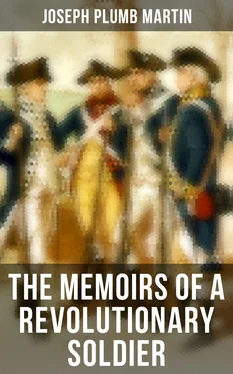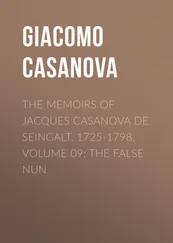Joseph Plumb Martin - The Memoirs of a Revolutionary Soldier
Здесь есть возможность читать онлайн «Joseph Plumb Martin - The Memoirs of a Revolutionary Soldier» — ознакомительный отрывок электронной книги совершенно бесплатно, а после прочтения отрывка купить полную версию. В некоторых случаях можно слушать аудио, скачать через торрент в формате fb2 и присутствует краткое содержание. Жанр: unrecognised, на английском языке. Описание произведения, (предисловие) а так же отзывы посетителей доступны на портале библиотеки ЛибКат.
- Название:The Memoirs of a Revolutionary Soldier
- Автор:
- Жанр:
- Год:неизвестен
- ISBN:нет данных
- Рейтинг книги:4 / 5. Голосов: 1
-
Избранное:Добавить в избранное
- Отзывы:
-
Ваша оценка:
- 80
- 1
- 2
- 3
- 4
- 5
The Memoirs of a Revolutionary Soldier: краткое содержание, описание и аннотация
Предлагаем к чтению аннотацию, описание, краткое содержание или предисловие (зависит от того, что написал сам автор книги «The Memoirs of a Revolutionary Soldier»). Если вы не нашли необходимую информацию о книге — напишите в комментариях, мы постараемся отыскать её.
Contents:
Campaign of 1776.
Campaign of 1777.
Campaign of 1778.
Campaign of 1779.
Campaign of 1780.
Campaign of 1781.
Campaign of 1782.
Campaign of 1783.
The Memoirs of a Revolutionary Soldier — читать онлайн ознакомительный отрывок
Ниже представлен текст книги, разбитый по страницам. Система сохранения места последней прочитанной страницы, позволяет с удобством читать онлайн бесплатно книгу «The Memoirs of a Revolutionary Soldier», без необходимости каждый раз заново искать на чём Вы остановились. Поставьте закладку, и сможете в любой момент перейти на страницу, на которой закончили чтение.
Интервал:
Закладка:
Sometime in October, the British landed at Frogg's neck, or point, and by their motions seemed to threaten to cut off our retreat to York-Island. We were thereupon ordered to leave the Island. We crossed King's bridge and directed our course toward the White Plains. We saw parties of the enemy foraging in the country, but they were generally too alert for us. We encamped on the heights called Valentine's hill, where we continued some days, keeping up the old system of starving. A sheep's head which I begged of the butchers, who were killing some for the "gentleman officers," was all the provisions I had for two or three days.
While lying here, I one day rambled into the woods and fields, in order, if possible, to procure something to satisfy the cravings of nature. I found and ate a considerable quantity of chestnuts, which are, as Bloomfield says of his acorns, "Hot thirsty food," which was, I suppose, the cause of our Doctor's blunder, as I shall relate directly. I returned to camp just at sunset, and met our orderly sergeant, who immediately warned me to prepare for a two day's command.—What is termed going on command, is what is generally called going on a scouting party, or something similar.—I told the sergeant I was sick and could not go; he said I must go to the Doctor, and if he said I was unfit for duty, he must excuse me. I saw our Surgeon's mate close by, endeavouring to cook his supper, blowing the fire and scratching his eyes. We both stepped up to him, and he felt my pulse, at the same time very demurely shutting his eyes, while I was laughing in his face. After a minute's consultation with his medical talisman, he very gravely told the sergeant, that I was unfit for duty, having a high fever upon me. I was as well as he was; all the medicine I needed was a bellyful of victuals. The sergeant turned to go off for another man, when I told him that I would go, for I meant to go; I only felt a little cross, and did not know how, just then, to vent my spleen in any other way. I had much rather go on such an expedition than stay in camp; as I stood some chance while in the country to get something to eat. But I admired the Doctor's skill; although, perhaps not more extraordinary than that of many others of the "faculty."
We marched from Valentine's hill for the White Plains, in the night. There were but three of our men present. We had our cooking utensils, (at that time the most useless things in the army,) to carry in our hands. They were made of cast iron and consequently heavy. I was so beat out before morning, with hunger and fatigue, that I could hardly move one foot before the other. I told my messmates that I could not carry our kettle any further; they said they would not carry it any further; of what use was it? they had nothing to cook and did not want any thing to cook with. We were sitting down on the ascent of a hill when this discourse happened. We got up to proceed, when I took up the kettle, which held nearly a common pail full, I could not carry it; my arms were almost dislocated; I sat it down in the road, and one of the others gave it a shove with his foot, and it rolled down against the fence, and that was the last I ever saw of it. When we got through the night's march we found our mess was not the only one that was rid of their iron bondage.
We arrived at the White Plains just at dawn of day, tired and faint—encamped on the plains a few days and then removed to the hills in the rear of the plains. Nothing remarkable transpired, while lying here, for some time. One day, after roll-call, one of my messmates with me, sat off upon a little jaunt into the country to get some sauce of some kind or other. We soon came to a field of English turnips; but the owner was there, and we could not get any of them without paying for them in some way or other. We soon agreed with the man to pull and cut off the tops of the turnips at the halves, until we got as many as we needed. After the good man had sat us to work, and chatted with us a few minutes, he went off and left us. After he was gone, and we had pulled and cut as many as we wanted, we packed them up and decamped, leaving the owner of the turnips to pull his share himself.
When we arrived at the camp, the troops were all parading. Upon inquiry, we found that the British were advancing upon us. We flung our turnip plunder into the tent—packed up our things, which was easily done, for we had but a trifle to pack, and fell into the ranks. Before we were ready to march, the battle had begun. Our regiment then marched off, crossed a considerable stream of water which crosses the plain, and formed behind a stone wall in company with several other regiments, and waited the approach of the enemy. They were not far distant; at least, that part of them with which we were quickly after engaged. They were constructing a sort of bridge to convey their artillery, &c. across the before mentioned stream. They however soon made their appearance in our neighbourhood. There was in our front, about ten rods distant, an orchard of apple trees. The ground on which the orchard stood was lower than the ground that we occupied, but was level from our post to the verge of the orchard, when it fell off so abruptly that we could not see the lower parts of the trees. A party of Hessian troops, and some English, soon took possession of this ground: they would advance so far as just to show themselves above the rising ground, fire, and fall back and reload their muskets. Our chance upon them was, as soon as they showed themselves above the level ground, or when they fired, to aim at the flashes of their guns—their position was as advantagious to them as a breastwork. We were engaged in this manner for some time, when finding ourselves flanked and in danger of being surrounded, we were compelled to make a hasty retreat from the stone wall. We lost, comparatively speaking, very few at the fence: but when forced to retreat, we lost, in killed and wounded, a considerable number. One man who belonged to our company, when we marched from the parade, said, "Now I am going out to the field to be killed;" and he said more than once afterwards, that he should be killed; and he was—he was shot dead on the field. I never saw a man so prepossessed with the idea of any mishap as he was. We fell back a little distance and made a stand: detached parties engaging in almost every direction. We did not come in contact with the enemy again that day, and just at night we fell back to our encampment. In the course of the afternoon the British took possession of a hill on the right of our encampment, which had in the early part of the day been occupied by some of the New-York troops. This hill overlooked the one upon which we were, and was not more than half or three fourths of a mile distant. The enemy had several pieces of field artillery upon this hill, and, as might be expected, entertained us with their music all the evening. We entrenched ourselves where we now lay, expecting another attack. But the British were very civil, and indeed they generally were, after they had received a check from Brother Jonathan, for any of their rude actions; they seldom repeated them, at least, not till the affair that caused the reprimand, had ceased in some measure to be remembered.
During the night we remained in our new made trenches, the ground of which was in many parts springy; in that part where I happened to be stationed, the water, before morning, was nearly over shoes, which caused many of us to take violent colds, by being exposed upon the wet ground after a profuse perspiration. I was one who felt the effects of it, and was the next day sent back to the baggage to get well again, if I could, for it was left to my own exertions to do it, and no other assistance was afforded me. I was not alone in misery; there were a number in the same circumstances. When I arrived at the baggage, which was not more than a mile or two, I had the canopy of heaven for my hospital, and the ground for my hammock. I found a spot where the dry leaves had collected between the knolls; I made up a bed of these, and nestled in it, having no other friend present but the sun to smile upon me. I had nothing to eat or drink, not even water, and was unable to go after any myself, for I was sick indeed. In the evening, one of my messmates found me out, and soon after brought me some boiled hog's flesh (it was not pork) and turnips, without either bread or salt. I could not eat it, but I felt obliged to him notwithstanding; he did all he could do—he gave me the best he had to give, and had to steal that, poor fellow;—necessity drove him to do it to satisfy the cravings of his own hunger, as well as to assist a fellow sufferer.
Читать дальшеИнтервал:
Закладка:
Похожие книги на «The Memoirs of a Revolutionary Soldier»
Представляем Вашему вниманию похожие книги на «The Memoirs of a Revolutionary Soldier» списком для выбора. Мы отобрали схожую по названию и смыслу литературу в надежде предоставить читателям больше вариантов отыскать новые, интересные, ещё непрочитанные произведения.
Обсуждение, отзывы о книге «The Memoirs of a Revolutionary Soldier» и просто собственные мнения читателей. Оставьте ваши комментарии, напишите, что Вы думаете о произведении, его смысле или главных героях. Укажите что конкретно понравилось, а что нет, и почему Вы так считаете.












